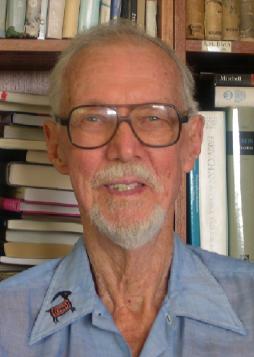|
Robert Aitken Interviewed by DC September 30, 1996 Robert Aitken dot net - official site for Robert Aitken Roshi Diamond Sangha Honolulu - Diamond Sangha Worldwide Judy Gilbert note on his passing at bottom. Robert Aitken was the teacher of John Tarrant, teacher of PZI (Pacific Zen Inst), and a cuke.com major benefactor. Robert Aitken remained a close friend of the San Francisco Zen Center, especially Michael Wenger, until his death. I remember a meeting we had with him during the difficult abbot transitional period following Richard Baker's resignation in 1983. There were a bunch of ZC priests with Aitken in the Hodge House, the guest facility that's now the Zen Hospice near the City Center. Aitken said that the SFZC was short on enlightenment and he could send one of his teachers, Nelson Foster I believe was one he suggested, to help out. Everyone politely listened except for Ananda Claude Dalenberg. Maybe someone else could remember what Ananda said but all I can remember is a general rejection of Aitken's assumptions strongly presented. And Ananda was never easy on the SFZC either. I remember a talk Aitken gave at the SFZC where he told about being interred by the Japanese for the entirety of WWII. Since he was a civilian POW though, he was just kept in a home in Kobe with a large library. Also there was the great translator of haiku R.H. Blythe. I asked him if he was aware of the Japanese Army plan to execute all prisoners of war toward the end and he looked at me like, how could you say such a terrible thing about my hosts? - dc Here's a bio on Hakuun Yasutani, Aitken's first teacher, which includes a brief bio on Aitken. I met Suzuki Roshi at the days when he was at Bush Street and attended a couple of those zazen meetings. It was I think in ‘64 or ‘65. We had a personal chat and Okusan brought us melted ice cream which led to general hilarity. I don’t remember what we talked about but it was just pleasantries. Ann and I always tried to drop by when we were in San Francisco which we often were when her parents were still alive. I was very fond of Suzuki Roshi and it meant a lot to me to have that connection. The last time we met was in the late summer of 1971. The Diamond Sangha had held a sesshin at San Juan Bautista. Suzuki Roshi and Reb and Dan stopped by at the very end of our sesshin and we had a little reunion there and he said a few words. So-on Roshi was there. Suzuki Roshi had deep fits of coughing at that time and was obviously very ill. I think it was then, I’m not sure, that he presented me with Zen Mind, Beginner's Mind. He was there for an hour or so. I think he stayed for the luncheon at the end of sesshin. I was at Tassajara when Yasutani and Soon went. It was a very convivial occasion. Yasutani Roshi took everybody to task about koan study. He did quite a little talk about how Soto Zen had abandoned its koan practice. I thought that was pretty gutsy, naughty of Yasutani Roshi. I remember all of us, the teachers, taking a hot bath together in the stream. It was rather warm then. That was the first time I met Yvonne. It was quite an occasion. Eido was there and Maezumi. And Flora Cortua - the author of "An Experience of Enlightenment," put out originally by the LAZC - Yasutani had asked her to write about it - she didn’t realize it was going to be published. IN 1986 the Theosophical Publishing House reprinted it and now it’s out of print again I think. We’d driven up from Los Angelous. DC: What do you think of the legacy that Suzuki Roshi left behind? I think that it’s the personality of the teacher that’s venerated in the San Francisco Zen Center line. In the Harada-Yasutani line, we remember those teachers but we don’t place them as centrally as Zen Center does with the statue there in the kaisando and so on. We don’t have a kaisando. The presence of Suzuki Roshi is very much in evidence still at the SFZC. It’s a more personal kind of veneration there at SFZC. DC: More devotional? Personal. DC note: I asked him about historical stuff, reading to do on Japan as background for working on Crooked Cucumber. I'm not a very fast reader and got to none of this. Sorry. There was an imperial rescript in 1870 or so that Emperor Meiji set forth that said all priests should marry. But they didn’t have to. Darn few lineages have remained celibate. Background reading: Eliot - Japanese Buddhism Prebish - Buddhism, a Modern Perspective Cook - Japanese Innovations to Buddhism look at bibliographies  8-05-10 - RIP
Robert Aitken 8-05-10 - RIP
Robert AitkenJudy Gilbert wrote: Thought you might want to post on cuke{dot}com that
Robert Aitken-roshi passed away this morning from complications from
pneumonia. Just copied this off of What's New for that day which is the day he died. - dc |